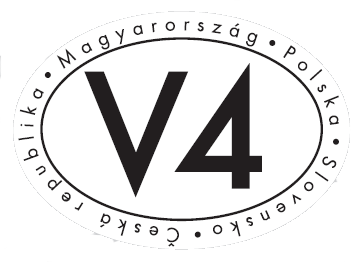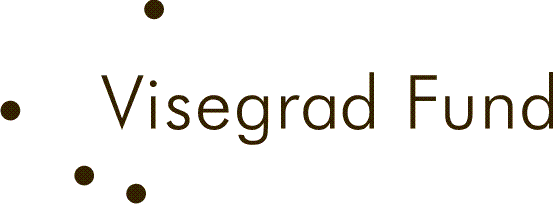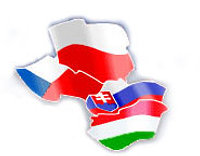Project Publications
| Book 1 | Book 2 | Book 3 | Book 4 | Book 5 | Book 6 | conference articles in journals |
Wach, K. (2014). The Role of Knowledge in the Internationalisation Process: An Empirical Investigation among Polish Businesses (chapter 7) In: D. Kiendl-Wendner & K. Wach K. (Eds.), International Competitiveness in Visegrad Countries: Macrto and Micro Perspective. Graz: Fachhochschule Joanneym (ISBN: 978-3-200-03673-4).
Full text: pdf (free download)
Abstract
In the era of the knowledge-based economy, especially with the constitution of the new paradigm of the entrepreneurial economy, it is knowledge which is attributed to play the key role in economic growth and socio-economic development, what is more knowledge plays a especial role for firms, in their corporate growth. Nowadays, business knowledge is increasingly used as an important variable to explain the process of internationalisation of firms. The aim of this study is to present the essence and role of knowledge in the internationalisation process as well as nature of knowledge-based models of internationalisation of the firm and to show the empirically proved dependences between knowledge and internationalisation process among surveyed Polish businesses. The research results do not let generalise and absolutise, nevertheless they prove that the level of experience on international markets among top management team is positively related to the acquisition and utilisation of knowledge on international markets, which proves the theoretical assumptions from the literature on knowledge-based models and learning process models. The mechanism of knowledge acquisition and utilisation impacts on the intensiveness of internationalisation coefficient, however there is weak correlation. The V4 survey was dedicated to general patterns of internationalisation and it was not assumed to research deeply into knowledge-based models, so this is why it is to be undertaken in the future.
Keywords: internationalisation, knowledge-based models, learning approach, business knowledge
JEL classification: M16, L20, L21
References
Barney, J.B. (1991). Firm Resources and Sustained Competitive Advantage. Journal of Management, 14(1), pp. 33-46.
Casillas, J.C., Moreno, A.M., Acedo, F.J., Gallego, M.A., Ramos, E. (2009). An Integrative Model of the Role of Knowledge in the Internationalization Process. Journal of World Business, 44.
Coviello, N.E., McAuley, A. (1999). Internationalisation and the Smaller Firm: A Review of Contemporary Empirical Research. Management International Review, 39(3).
Daszkiewicz, N. (2004). Internacjonalizacja małych i średnich przedsiębiorstw we współczesnej gospodarce. Gdańsk: Scientific Publishing Group.
Daszkiewicz, N. (2014). Internationalization and Europeanization of Businesses in the Single European Market (chapter 2), In: B. Knežević & K. Wach (eds), International Business from the Central European Perspective. Zagreb: University of Zagreb, pp.15-24.
Daszkiewicz, N. & Wach, K. (2012). Internationalization of SMEs: Context, Models and Implementations. Gdańsk: Gdańśk University of Technology Publishers.
Daszkiewicz, N. & Wach, K. (2014). Motives for Going International and Entry Modes of Family Firms in Poland. Journal of Intercultural Management, 6(2).
Duréndez, A. & Wach, K. (eds) (2014). Patterns of Business Internationalisation in Visegrad Countries – In Search for Regional Specifics. Cartagena: Universidad Politécnica de Cartagena.
Forsgren, M. (2002). The Concept of Learning In the Uppsala Internationalization Process Model: A Critical Review. International Business Review, 11.
Gorynia, M. (2007). Strategie zagranicznej ekspansji przedsiębiorstw, Warszawa: PWE.
Gubik, A.S. & Karajz, S. (2014). The Choice of Foreign Market Entry Modes – The Role of Resources and Industrial Driving Forces. Entrepreneurial Business and Economics Review, 2(1).
Jarosiński, M. (2014). Characteristics of Polish Firms’ Internationalisation Processes (chapter 4), In: B. Knežević & K. Wach (eds), International Business from the Central European Perspective. Zagreb: University of Zagreb, pp. 43-52.
Javalgi, R.G., Deligonul, S., Dixit, A., Cavusgil, S.T. (2011). International market Reentry: A Review and research Framework. International Business Review, 20(5).
Johanson, J., Vahlne, J.-E. (1977). The Internationalization Process of the Firm: A Model of Knowledge Development and Increasing Foreign Commitments. Journal of International Business Studies, 8(1).
Johanson, J., Vahlne, J.-E. (1974). The Internationalization Process of the Firm. Mimeographed Working Paper, Uppsala: Department of Business Administration.
Johanson, J., Vahlne, J.-E. (1990), The Mechanism of Internationalization. International Business Review, 7(4).
Johanson, J., Vahlne, J.-E. (2009). The Uppsala Internationalization Process Model Revisited: From Liability of Foreignneess to Liability of Outsidership. Journal of International Business Studies, 40(9).
Johanson, J., Wiedersheim-Paul, F. (1975). The Internationalization of the Firm: Four Swedish Cases. Journal of Management Studies, 12(3).
Kutschker, M., Bäurle, I., Schmid, S. (1997). International Evolution, International Episodes, and International Epochs – Implications for Managing Internationalization. Management International Review, 37(2), special issue.
Mejri, K., Umemoto, K. (2010). Small- and Medium-Sized Enterprise Internationalization: Towards the Knowledge-Based Model. Journal of International Entrepreneurship, 8(2). Melin, L. (1992). Internationalization as a Strategy Process. Strategic Management Journal, 13.
Morris, Sh., Hammond, R. & Snell, S. (2014). A microfoundations approach to transnational capabilities: The role of knowledge search in an ever-changing world. Journal of International Business Studies, 45(4), pp. 405-427.
Penrose, E.T. (1959). The Theory of the Growth of the Firm, Oxford: Oxford University Press. Rundh, B. (2001), International Market Development: New Patterns in SMEs International Market Behaviour?. Market Intelligence & Planning, 19(5).
Ruzzier, M., Hisrich, R.D., Antoncic, B. (2006). SME Internationalization Research: Past, Present, and Future. Journal of Small Business and Enterprise Development, 13(4).
Wach, K. (2012a). Europeizacja małych i średnich przedsiębiorstw: rozwój przez umiędzynarodowienie, Warszawa: PWN.
Wach, K. (2012b). Wybrane modele internacjonalizacji przedsiębiorstw bazujące na wiedzy. In: S. Wydymus & M. Maciejewski (eds), Innowacyjność i wiedza we współczesnym handlu międzynarodowym. Kraków: Fundacja Uniwersytetu Ekonomicznego w Krakowie.
Wach, K. (2014a). Familiness and Born Globals: Rapid Internationalisation among Polish Family Firms. Journal of Intercultural Management, 2(3/4).
Wach, K. (2014b). Theoretical Framework of the Firm-Level Internationalisation in Business Studies (chapter 1). In: A. Duréndez, K. Wach (eds), Patterns of Business Internationalisation in Visegrad Countries – In Search for Regional Specifics. Cartagena: Universidad Politécnica de Cartagena.
Wach, K., Wehrmann, C. (2014). Entrepreneurship in International Business: International Entrepreneurship as the Intersection of Two Fields (chapter 1). In: A.S. Gubik & K. Wach (eds.), International Entrepreneurship and Corporate Growth in Visegrad Countries. Miskolc: University of Miskolc Press.
Wach, K., Wojciechowski, L. (2014). The Size and the Strategic International Orientation: The Use of EPRG Model among Polish Family and Non-Family Firms. Przedsiębiorczość i Zarządzanie, XV(7[1]), pp. 143-156.
Whitelock, J. (2002). Theories of Internationalization and Their Impact on Market Entry. International Market Review, 19(4).
Witek-Hajduk, M. (2010), Strategie internacjonalizacji polskich przedsiębiorstw w warunkach akcesji Polski do Unii Europejskiej. Warszawa: OW SGH.
Czech Republic
Hungary
Poland
Slovakia

Contact:
Dr hab. Krzysztof Wach
Cracow University of Economics
wachk@uek.krakow.pl
www.wach.uek.krakow.pl

